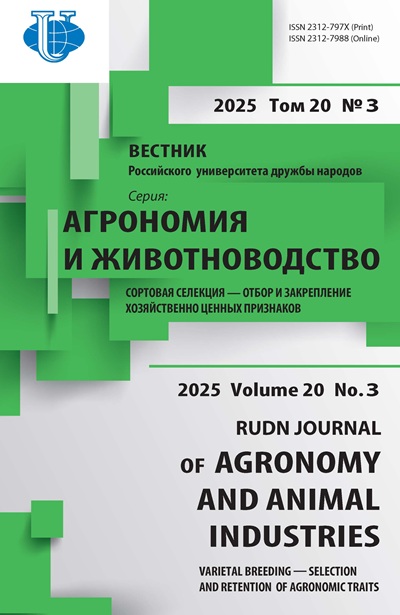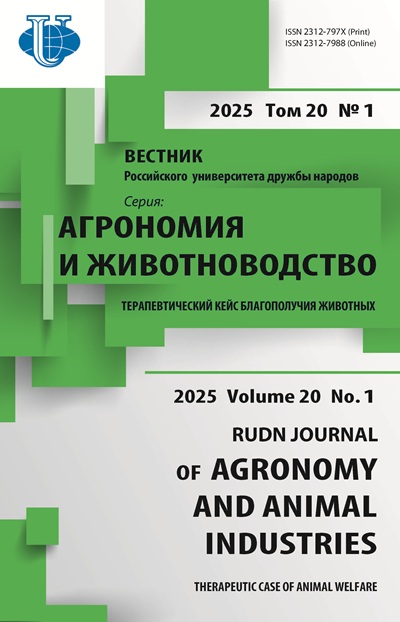From the editorial
- Authors: Vatnikov Y.A.1
-
Affiliations:
- RUDN University
- Issue: Vol 20, No 1 (2025): Therapeutic case of animal welfare
- Pages: 9-11
- Section: Therapeutic case of animal welfare
- URL: https://agrojournal.rudn.ru/agronomy/article/view/20163
- ID: 20163
Cite item
Full Text
Abstract
-
Full Text
The thematic issue of RUDN Journal of Agronomy and Animal Industries presents scientific articles, which reveal both fundamental and applied aspects of animal welfare. This concept includes key indicators such as physical, mental and emotional state, conditions of detention and feeding, therapeutic, research aspects, legal normative acts, as well as daily control and monitoring of the entire range of these norms. Such diversity requires a veterinarian to have versatile knowledge and skills that allow to monitor numerous factors throughout the animal’s life, technological cycles of raising and producing. In this regard, scientific support is in an integral part of production and requires the researcher to have a deep understanding of the problem of technological safety of farm animals, as well as solving specific problems that arise in the overall control over animal welfare, providing science-intensive conclusions that ensure practical potential.
The scientific article ʺMonitoring of biochemical parameters of blood serum of calves against the background of the use of a betulin-containing feed additiveʺ presents the results of clinical testing of the feed additive containing natural adaptogen Betulin. The scientific team studied the effect of the botulin-containing feed additive on biochemical indicators of blood serum of pedigree calves and highly productive dairy cattle. Scientists from Belgorod State Agrarian University named after V.Y. Gorin conducted research on the effectiveness of using the Batsell-MT feed additive in the diet of dry cows when preparing them for calving, as well as to increase productivity and improve the condition of the offspring. It was found that the use of Batsell-MT contributes to livestock preservation, normalization of biochemical parameters of blood, improvement of the quality of milk and offspring. In the article ʺTreatment of local pododermatitis in cattle in conditions of intensive technologiesʺ, the authors show that a single application of Vet-Kopin ointment led to reduction of pathology and decrease in pain. After five applications, the clinical signs of inflammation disappeared, the bottom of the pathology was replaced by healthy granulation tissue, followed by epithelialization and scarring of the surrounding tissues throughout the entire study period. The study ʺEffect of a multi-enzyme complex on morphometric and chemical parameters of carcasses of Ross 308 cross chickensʺ is quite relevant. The scientific research of a team of specialists in the field of surgical infection identified ʺAdvantages and disadvantages of negative pressure wound therapy in equine wound treatmentʺ, as described in their article of the same name. It was found that the average rate of wound healing using local negative pressure was 30...40% higher compared to treatment with antiseptic and antibacterial drugs. The scientific article ʺAnalysis of C-reactive protein levels in uterine fluid of dairy cowsʺ established that determining the concentration of acute phase protein in uterine fluid can be an effective method for detecting inflammatory conditions in this organ.
Technological disorders, stress, non-compliance with zohygienic standards, and a low level of veterinary care can lead to diseases. Hence, the assessment of animal welfare should be science-based and as objective as possible. A multifaceted approach to assessing animal welfare is needed considering not only objective indicators but also the subjective picture of the animal’s condition in its attempts to adapt to its forced environment. An important component of well-being is therapeutic support, and its compliance and maintenance are significant not only for the animals but also reflect production, moral, and ethical values.
About the authors
Yuriy A. Vatnikov
RUDN University
Author for correspondence.
Email: vatnikov-yua@rudn.ru
References
Supplementary files















